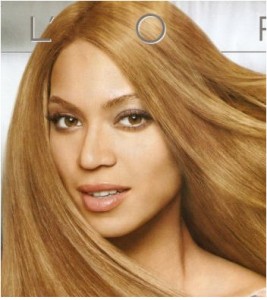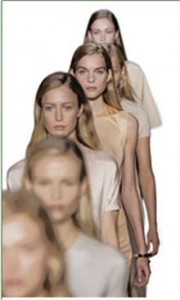 It should go without saying that just because a black face appears on the cover of a fashion magazine, or on the runway of a fashion show, does not mean that there’s diversity in the fashion industry. Especially since that black face is most often half-white (like Halle Berry’s) or digitally whitened (like Beyoncé’s).
It should go without saying that just because a black face appears on the cover of a fashion magazine, or on the runway of a fashion show, does not mean that there’s diversity in the fashion industry. Especially since that black face is most often half-white (like Halle Berry’s) or digitally whitened (like Beyoncé’s).
Yet far too many erstwhile intelligent people (black and white) buy into this tokenism … literally. Only this explains why a shocked and indignant female friend sent me an article yesterday with the title Is the fashion industry racist? Yes – and it goes right to the core.
Here are some of the more “enlightening” excerpts:
I’ve not long returned from the resort collections for 2012. At Chanel, not a single black model walked among nearly 60 girls. At Yves Saint Laurent, only one black model was on the catwalk: Marihenny Passible, an incredibly beautiful Dominican woman. And if you look at the covers of fashion magazines, you’d think Britain was still as ethnically undiverse as it was in the Fifties.
Yes, of course, we see Beyoncé on many magazine covers and actress Thandie Newton has graced the cover of InStyle. Both women have landed lucrative ad campaigns: Beyoncé at L’Oréal, Thandie at Olay. But these women are always so airbrushed, their hair ironed within an inch of its life, that they look almost white.
The problem is, as one black model puts it: ‘Fashion is still ghettoising those of us with very dark skin. Beyoncé is always made to look so much paler than she really is that I don’t really relate to her.’
So far in 2011, not one black face has appeared on the cover of British Vogue. In fact, the last time British Vogue had a black woman on the cover was in November 2008… For a black model to succeed, she needs a powerful protector. Naomi Campbell was championed by the late designer, Gianni Versace.
Unfortunately, the number of designers who think as he did are thin on the ground. Stella McCartney is a rarity in that she always casts diverse models…
I talked to Carole White, who founded Premier Model Management in 1981… Carole says the problem stems from the influential fashion capitals of Milan and Paris. ‘There, they absolutely don’t want black girls. A black model has to be a real star before you can take her there.’
Carole most famously represented Naomi Campbell for most of her career. She says: ‘Clients never wanted to pay Naomi as much as the white girls. It was always a battle.’
Why? ‘She was just as famous as the other supers, so who knows why.’
(Liz Jones, Mail Online, June 13, 2011)
 But, like I indicated above, this is hardly a revelation. In fact, here is how I presaged four years ago much of what Liz wrote in this article two days ago:
But, like I indicated above, this is hardly a revelation. In fact, here is how I presaged four years ago much of what Liz wrote in this article two days ago:
I’m not too focused on how bone thin these bitches walking the runways at NYC’s Fashion Week are to notice how bone white they are also!
Frankly, one could be forgiven the impression that – since Alek Wek is busy promoting her extraordinary autobiography, and a semi-reformed Naomi Campbell is busy raising funds for flood victims – no other black models are worthy of showing off the clothes of the world’s top fashion designers.
(Fashion model fired for being too skinny. Hallelujah! The iPINIONS Journal, September 12, 2007)
The only thing I will add today is that unless non-white women, especially Asians and Latinas, stop doing all they can to look white, this racist trend will continue.
For starters, black women can stop covering up their natural hair with wigs made of white women’s hair. Indeed, why should white fashionistas hire black models to appeal to black women who just want to look white? Frankly, I find nothing more unattractive and pathetic than a black woman sporting a long, blond wig.
On the other hand, if these women exhibited more pride in their ethnicity, their purchasing power would compel the arbiters and gatekeepers of fashion to feature women who look like them (even with nappy hair and dark skin) in magazines and on the runways.
Apropos of this, Ebony Fashion Fair was forced to cancel its annual shows two years ago and its cosmetics line is on life support because “black” beauties like Halle and Beyoncé have convinced black women that it’s better to buy their cosmetics from white companies like Revlon and L’Oréal instead of Ebony Fashion Fair – even though they all sell the same products.
Related commentaries:
Fashion model fired for being too skinny